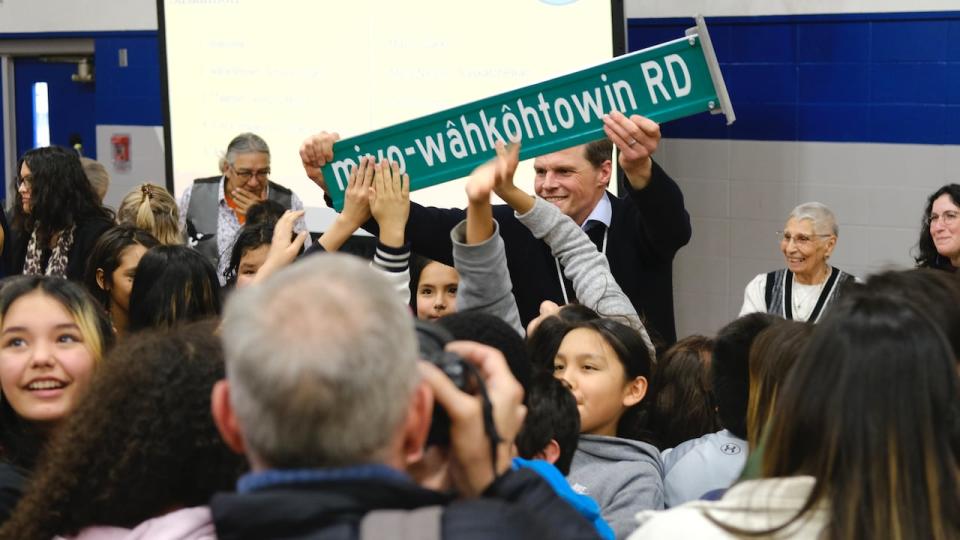Replacement of John A. Macdonald Road signs with miyo-wâhkôhtowin name shows a 'culture that survived': elder

Sparks flew as a city worker buzzed through an old John A. Macdonald Road sign outside Saskatoon's wâhkôhtowin School on Thursday.
It was a monumental day for many Indigenous people and other residents in the city, as the new signs for what is now miyo-wâhkôhtowin Road were installed, replacing the John A. Macdonald signs that were taken down.
Macdonald, Canada's first prime minister, has been criticized for his role in supporting the residential school system, which removed Indigenous children from their families from the 1870s to the 1990s. Many suffered horrific abuse.
The change has been a long time coming, after city council voted in favour of finding a new name for the road in June 2021.
In August 2023, council voted in favour of the name miyo-wâhkôhtowin, which means "good relationship" in Cree.
Elder Roland Duquette was a guest speaker at wâhkôhtowin School on Thursday.
He told the packed gymnasium about his experience at residential schools.
"I was a child, but my child[hood] was taken away. I was never a child until I grew up," said Duquette.
Many residential school survivors have found their own path to healing, he said, but his was in spirituality, language and ceremony.
"My behaviour was not right, but I redeemed myself from that when I found out it was not my fault," he said.
He also said Thursday's change is about more than a name — "it's more to identify another culture that survived."
Vision for 'a stronger future for everyone': mayor
After the assembly, students ran up to touch one of the new street signs and shake hands with Mayor Charlie Clark, who also spoke at the school.
Clark, who supported the name change, said it was a powerful moment.
"I just talked to a longtime leader who told me that she lived in this neighborhood and it was one of the proudest moments that she has had in her life of living in Saskatoon," he said.

Saskatoon Mayor Charlie Clark holds one of the new miyo-wâhkôhtowin Road signs that were installed on Thursday. (Liam O'Connor/CBC)
The mayor said he and Ward 3 Coun. David Kirton walked up and down miyo-wâhkôhtowin Road prior to the official switch on Thursday to talk with residents, one of whom was a residential school survivor.
Clark said there are no imminent street name changes that council is considering, but that the miyo-wâhkôhtowin Road process points to how outdated some names are, and how positive the change can be.
"To have children here who are able to feel proud of who they are and [who are] able to learn that language and culture is the opposite of what happened" in Canada in the past, said Clark.
"It's a vision for how we can try and build a stronger future for everyone."
Some residents have raised concerns over the logistics of changing things like mail, passports and licences following the name change, but the mayor said there is ongoing communication and work being done with residents to ensure the change is done "without a cost and it's streamlined."
The mayor said he is not sure when online maps, such as those from Apple and Google, will update to show the new road name.

 Yahoo News
Yahoo News 
